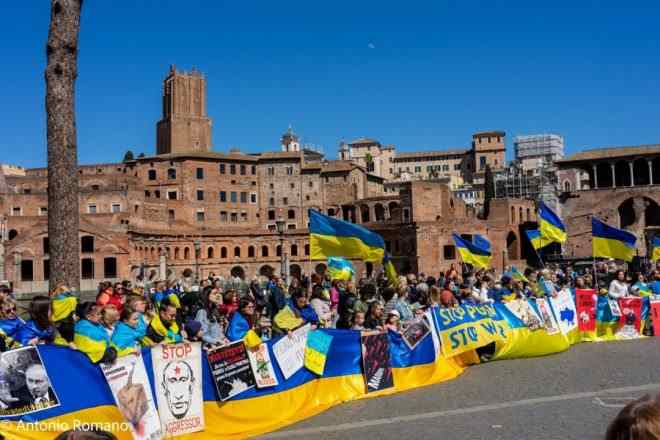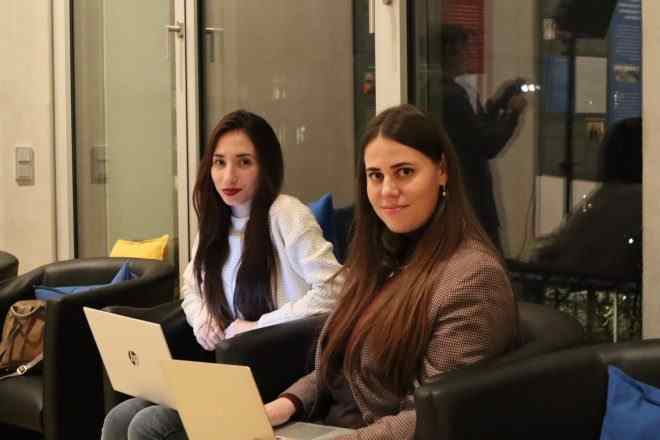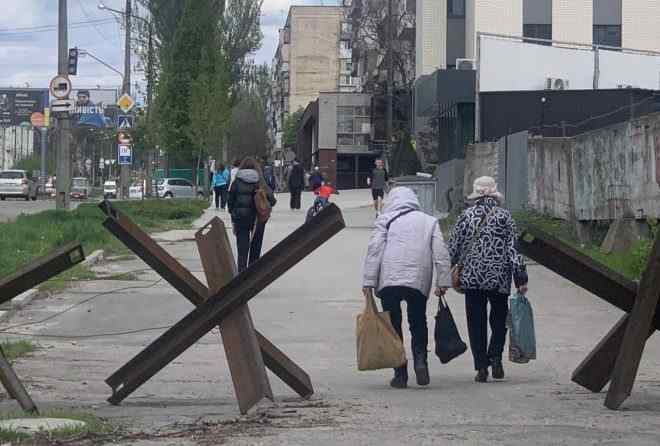“In fact, I did not really want to emigrate at first”
This was how we started our conversation with Ruslana Polianska. She is a Roma now living in Italy. She was forced, just like millions of others, to move outside Ukraine by the full-scale war. And, just like millions of other Ukrainians, she used to be overwhelmed by a feeling of guilty, and craving for home, and doubts over the decision she had made.
We are now talking with Ruslana over the difficulties in getting used, the survivor’s guilt and the ways you can be useful to Ukraine even if you are far away. And – over stereotypes towards Roma in Italy and the influence they have over the Roma community in both of the countries.
Below follows direct speech.

My Mom lives in Italy, working here. At home, in Zaporizhia, I was then living with my elder brother. Actually, it was him who woke me up in the morning on February 24, saying that a full-scale war had begun and we were being bombed. I could not realize at once what had happened: I just sat for some 10 minutes trying to get everything. Those feelings were terrific.
We had not made any preparations (for the war – Editor). I knew that some people had already packed their “alarm cases” with the documents, medicines, some basic clothes – we did not do that. I only packed a pair of jeans, a sweater and the notebook. The first days were spent in some kind of mist.
The Russian troops smashed through to the territory of Zaporizka region quite rapidly. By the moment I had a relationship and actually, it was my boyfriend who forced me to leave. He is a foreigner, so he was then bringing his family, so I joined them. Together we reached Poland where they followed their way on, while I took mine to Italy.
I can remember quite brightly as I was saying to my brother that I would be leaving – and he supported me with the decision, for life is above all. But now I do realize that at the moment the decision was then being made somewhere on the edge in between panic and depression. As my boyfriend started insisting that I should leave, I agreed to that, being under an emotional stress. It was finally clear what I was doing as we were saying goodbye: I did not know if I would return and see him alive…that was horrible so I burst into tears, and so he did.
WHEN YOU’RE OUTSIDE UKRAINE – THE ANXIETY GETS STRONGER
It was very hard for me to get used. I am a social person, I always need somebody to communicate to, be going to somewhere. As I had only arrived, I had no acquaintances or friends. And as I was starting to get some, of course it made things better but still the Italians could understand my feelings at full. They just could not take what it means when a war is going on.
After all, it takes some 40 minutes by public transport to get to the place where my friends who I could talk to – and I’d love to. There is no point in going there on a working day, as the last bus leaves at 6:30 PM. So I took the trips once a week only.
As a result, I got a depression: no language skills, no friends, no fluent communication and had no wish to go out at all. I addressed a psychologist, and she really helped me. For I had come here but had not changed anything: I kept following the news, and every air alarm I used to call girlfriends, my brother, asking how things went on with them. You are not worried about yourself but over those left behind. As I was still in Ukraine, the anxiety feeling was less, as I was close to my folks. And once you are far away and don’t really know what is going on over there, a panic starts. The people who stayed back in Zaporizhia, they kept even calmer than me in the situation. And that made me think over saving my resources and use it to a more efficient purpose.

Rally in Italy in April 2022. Photo by Antonio Romano
IT IS IMPORTANT TO BE HELPFUL FOR UKRAINE WHEREVER YOU ARE
As I arrived, the survivor’s guilt grew worse rapidly. I have a journalist’s degree and I had already been working by the specialty and there I was, leaving while I thought I had to be in Ukraine, keep on writing, help in some way! By the moment I was not working as a journalist but the responsibility feeling grew drastically with the beginning of the full-scale invasion.
So it was as I arrived to Italy on March 7, and Vova – one of ARCA’s Vice-Presidents – wrote me by late March. He offered me a journalist’s position in the organization. Of course, I agreed, since, for one thing, it gave me an opportunity to be helpful using my professional skills, and, secondly, to be honest, living in Italy takes more money than in Ukraine. So I realized that living on social allowances was not an option for me.
I only wrote for the war topics at first, which looked only too logical. I wrote about activists helping Roma and others, about the opposition movement events. Later other topics started to be added. As I listened to people’s stories, those living right there in the war conditions, my guilt grew again – I felt as if I were out of reality. Here I am listening to the person telling me what she had gone through –and here am I sitting in the sun of Italy, just talking. This was mostly the feeling I got conversing with those from Mariupol.
I have always been interested in the topic of women’s activism, the subject of the patriarchal society. I wrote most of my texts after talking with women who had left and continued helping those staying in Ukraine or outside. Among the characters in my stories there were immigrant Roma and those serving as soldiers in the Ukrainian Armed Forces (the UAF, the ZSU in Ukrainian).
But then again, it was not easy at all, to communicate with them. The Roma community is generally quiet secluded and even common interviews were not easy to appoint. And the more so as the subject of the conversation became sensible. We coped with it, though but to find Roma in the military services and not concealing their nationality, is a rather complicated task. To my mind, it is partly due to the stereotypes concerning Roma, and to a possible negative attitude towards them but still it seems to me that back in Ukraine this phenomenon is slowly decreasing.

During the Roma Civil Society Forum (Berlin, 2022)
IN ITALY ROMA MOSTLY NEVER ADMIT THEIR NATIONALITY
Personally, I never faced any discrimination against Roma. I may look like one and yet may not, so few could tell from the first sight that I am really a Rom woman.
But still there is a phenomenon in Italy that surprised me: here Roma mostly do not say openly of their nationality. The very word “Tsygany” (or “zingari”) meaning Gypsy, has a very negative connotation. There are lots of Roma from Romania here, and they live a terribly poor life. Local activists told me there were some settlements with Roma with no documents at all. They had not received any, not becoming Italian citizens and, being Romanian citizens no more. Some mad processes are ongoing in general over there. And it is complicated to get those documents. The difficulty is, in particular, in the fact that there are numerous legal things defined at the level of some particular municipalities. And that’s why Roma from various places cannot get their documents at the same time – everything is very different from place to place.
I watched a situation. There was a woman with a child at a bus station, looking like a Roma. She may have been one. She went over the whole station, asking for a phone to make a call. And nobody gave her theirs, afraid of her stealing it. That’s why Roma living in Italy try not to say who they are by nationality, just because of such stereotypic attitude.
Here Roma’s activists’ movement is not as such high level as it is in Ukraine; at least, from what I was told by the local public persons, there are only 1 or 2 larger organizations here. Perhaps, there are some minor ones, but no more that a couple of them you get to hear of. There are many more of them in Ukraine. So maybe that’s why the attitude is somewhat different.
For instance, our colleagues from “ARCA” were addressed by some local public activists from Okhtyrka in Sumy region, who were asking to raise money for a car for their territorial defense units. So they joined the event. And when the soldiers were told that Roma had also helped with buying the car, they were much surprised. It seems to me that such cases bring a positive influence to the attitude to Roma in general.
IF I WERE TO MAKE THE SAME DECISION NOW, I WOULD NOT LEAVE
My yearn to come back is even stronger than my fear. Of course, a bit scary, but the wish to come back wins.
You are watching the landscapes in Italy – yes they are beautiful but still in my thoughts those from Ukraine keep coming. Those plains as you are traveling somewhere to the seashore. The steppes. And you get drawn to your Motherland.
Generally, we were then planning to come back in November but at that time there were lots of bomb drops then and major blackouts were starting.

Zaporizhzhia in the spring of 2022. Photo: Ukrainian Pravda
If I were making the same decision now, I would not leave. But it seemed only right at that moment. I was then thinking I was only leaving for a two-weeks’ time, and would come back soon. No, of course it did not happen that way…But now I have made up my mind to come back to Ukraine in spring for sure. I had graduated my studies, my Bachelor’s degree, I am a journalist and would like to enter the Magistrate. But I did not have an opportunity to do it this year, having no wish to start my studies here. I want to be a student in my native land, so I am sure to return.
By Iryna Soviak, the Varosh media
Photos by Ruslana Polianska, granted personally and from her Facebook account
This article has been compiled with the support from the International “Renaissance” Fund, within the scope of the project “Counteraction to prejudices and stereotypes towards Roma during war, consolidation around the common strive for victory”. The article reflects the authors’ opinions, which may not necessarily coincide with that by the International “Renaissance” Fund.





